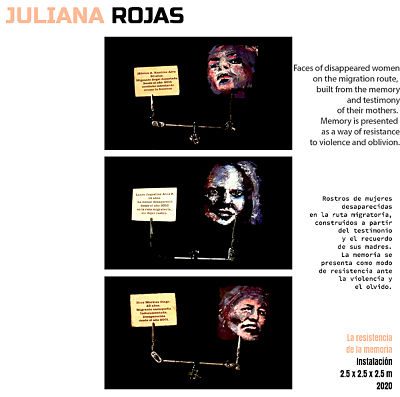Gallery
Please find here the approved applications to the Social Art Award 2021 – New Greening. The open call was closed on 1 May.
The next Open Call for the Social Art Ward will be opened in 2023.
Title:
The resistance of memory
The resistance of memory
Author:
Juliana Rojas
Juliana Rojas
Description:
This work has been carried out from the testimony of others and presents the faces of women who disappeared on the migration route, through the testimony of their mothers. The memory is presented in this series as a way of resistance to violence and oblivion. It is absolutely complex to clearly expose what one is vitally exposed to. Today's societies have never been so divided and the discourses around difference have never been so fierce. In this context, I propose that affect implies a form of resistance, a way of keeping an inner dimension safe from external aggressions. Affection allows us to be aware of the connection that we maintain with ourselves and with the other, before which the fact that language is useless, is not enough. Eliminating the utilitarian practice to give way to the affective dimension implies a resistance against commercialism that conceives the world only as a means of production. Contrary to the prevailing logic today, affect assimilates the contained world as an end in itself, therefore it is a value that the present time claims framed in an ethic of care. Affection as a humanizing entity consists of rebelling against the orders that try to convert each and every human interaction into an economic process. It is important to resist invasive forms of culture. Juliana Rojas.
This work has been carried out from the testimony of others and presents the faces of women who disappeared on the migration route, through the testimony of their mothers. The memory is presented in this series as a way of resistance to violence and oblivion. It is absolutely complex to clearly expose what one is vitally exposed to. Today's societies have never been so divided and the discourses around difference have never been so fierce. In this context, I propose that affect implies a form of resistance, a way of keeping an inner dimension safe from external aggressions. Affection allows us to be aware of the connection that we maintain with ourselves and with the other, before which the fact that language is useless, is not enough. Eliminating the utilitarian practice to give way to the affective dimension implies a resistance against commercialism that conceives the world only as a means of production. Contrary to the prevailing logic today, affect assimilates the contained world as an end in itself, therefore it is a value that the present time claims framed in an ethic of care. Affection as a humanizing entity consists of rebelling against the orders that try to convert each and every human interaction into an economic process. It is important to resist invasive forms of culture. Juliana Rojas.
Description:
This work has been carried out from the testimony of others and presents the faces of women who disappeared on the migration route, through the testimony of their mothers. The memory is presented in this series as a way of resistance to violence and oblivion. It is absolutely complex to clearly expose what one is vitally exposed to. Today's societies have never been so divided and the discourses around difference have never been so fierce. In this context, I propose that affect implies a form of resistance, a way of keeping an inner dimension safe from external aggressions. Affection allows us to be aware of the connection that we maintain with ourselves and with the other, before which the fact that language is useless, is not enough. Eliminating the utilitarian practice to give way to the affective dimension implies a resistance against commercialism that conceives the world only as a means of production. Contrary to the prevailing logic today, affect assimilates the contained world as an end in itself, therefore it is a value that the present time claims framed in an ethic of care. Affection as a humanizing entity consists of rebelling against the orders that try to convert each and every human interaction into an economic process. It is important to resist invasive forms of culture. Juliana Rojas.
This work has been carried out from the testimony of others and presents the faces of women who disappeared on the migration route, through the testimony of their mothers. The memory is presented in this series as a way of resistance to violence and oblivion. It is absolutely complex to clearly expose what one is vitally exposed to. Today's societies have never been so divided and the discourses around difference have never been so fierce. In this context, I propose that affect implies a form of resistance, a way of keeping an inner dimension safe from external aggressions. Affection allows us to be aware of the connection that we maintain with ourselves and with the other, before which the fact that language is useless, is not enough. Eliminating the utilitarian practice to give way to the affective dimension implies a resistance against commercialism that conceives the world only as a means of production. Contrary to the prevailing logic today, affect assimilates the contained world as an end in itself, therefore it is a value that the present time claims framed in an ethic of care. Affection as a humanizing entity consists of rebelling against the orders that try to convert each and every human interaction into an economic process. It is important to resist invasive forms of culture. Juliana Rojas.



